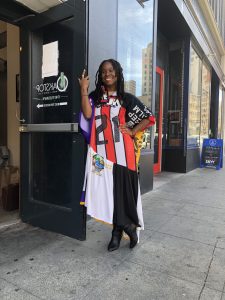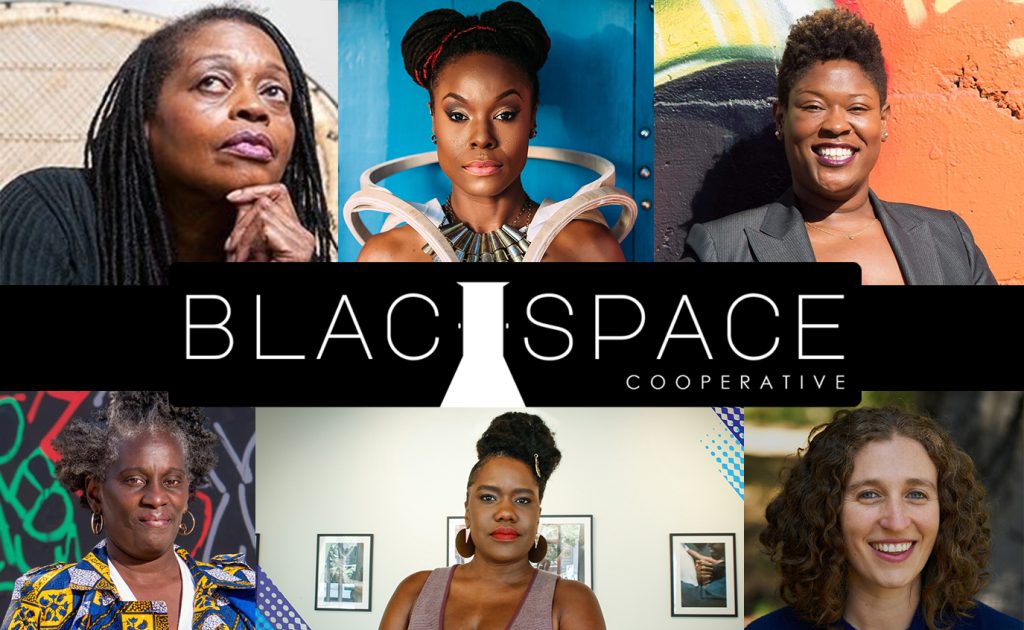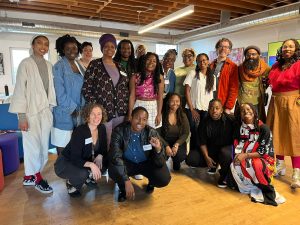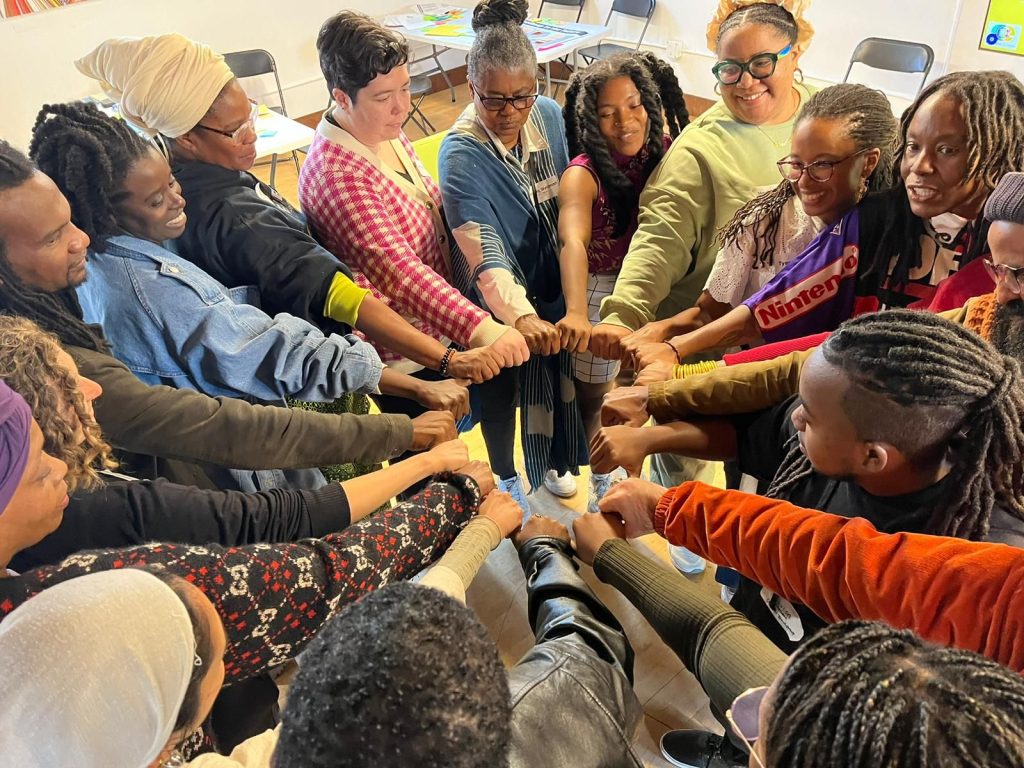Cultural architect Zakiya Harris has said that the need to solidify the presence and permanence of Black people, Black art, and Black culture in Oakland, California, became clear in the wake of the recent global pandemic and the George Floyd uprisings of 2020.
During that time, gentrification and cost of living in Oakland surpassed cities like San Francisco, forcing Blacks and other people of color to relocate. Temporary and short-term leases strangled the existence of Black businesses and arts and cultural organizations.
These same arts and cultural groups led the charge to ensure that Oaklanders persevered. They were the first responders who provided access to rapid COVID testing, food, and other services. Their murals portrayed protests of racial inequity and police brutality, but also encouraged solidarity, self-determination, and activism. Yet, these groups were fighting to survive economically in the same city that leaned on them for answers during a dire stretch of time.
“At that time, our city — like many cities across the country — was going through major disruption and shifts. Because we were on lockdown, it gave organizations — and Black organizations in particular — an opportunity to have deep listening sessions, and to take a step back from the work and look at things in a new way,” Harris said.
BlacSpace Cooperative became that lasting response. Still in its infancy, BlacSpace constructed a self-supportive Black-business and economic-development ecosystem to continuously seed Black arts, ownership, and culture in Oakland, now and in the future. The co-op is the container that creates and collects talent, services, funding, and knowledge and shares those resources with its members.
“We are here to say that we want to stay in Oakland. We deserve to stay in Oakland. We want to make it as a Black presence,” said Carolyn Johnson, CEO of the Black Culture Zone (BCZ) and BlacSpace co-founder.

Historically, Black cultural and creative enterprises had supported economies, creating jobs, and driving positive sustainability. Harris, an artist, vocalist, East Oakland native, entrepreneur, and consultant with over two decades experience of working with Black cultural and arts organizations, knew this. She led the charge to explore lasting, substantial strategies for shifting the city’s economy to value the Black communities that had lived in the city for most of its 171 years, and who shaped the cultural roots from which the city profited.
In 2020, Harris co-founded BlacSpace with Johnson from BCZ; Anyka Howard from the Betti Ono Foundation; Dr. Ayodele Nzinga from the Black Arts Movement Business District Community Development Corporation (BAMBD CDC); Noni Session from East Bay Permanent Real Estate Cooperative (EBPREC); and Anna Shneiderman, formerly of the Ragged Wing Ensemble, and who now shares administrative roles with Harris. The Co-op incorporated in November 2022.
Harris refers to these founding organizations as Black cultural anchors because of the collective work they put into advancing their own and other Black organizations. “We’re not trying to be just another cooperative…. We actually want to create revenue streams and other resources,” she said.

A cooperative with a twist
Harris has also said that Black people have always used cooperatives as synergistic methods to support each other’s progress. She cited the Black Church and the Black Panthers as examples. BlacSpace follows traditional cooperative footsteps with a bit of a unique twist. The cooperative is open to Black arts and cultural organizations and anchors that seek some form of permanence, whether a physical space or an ongoing presence.
“We’re thinking of BlacSpace physically as actual Black-owned spaces, but we’re also thinking about it a little bit more metaphorically. The Betti Ono Foundation right now does not have a physical brick and mortar space in Oakland, but they are working with Bay Area Rapid Transit (BART) to create safe spaces on public transportation,” Harris said. “One of the major ways that Black women are sexually assaulted happens in public transportation. The Betti Ono Foundation is working with BART to change that. They don’t have to be a brick and mortar space to create a Black space.”
A roadmap toward permanence and sustainability
BlacSpace offers a roadmap, and helps members and other groups navigate a way around external funding dependencies, or the need every two-to-three years to “do a new dance” to access money based on funders’ priorities, not the organizations’ needs.
A mutual aid network is one way the cooperative synergizes efforts and resources. Members might share BlacSpace staff, so that they would not need to double as volunteers in pursuit of the mission. If a bookkeeper is needed, one could be hired to address the needs of multiple members.
Knowledge is also shared, recorded and archived for future use.
“For Betti Ono, that means funding a cultural permanence strategy, so they can really figure out [their options]. For BAMBD CDC, it was a staffing strategy. We hired an HR consultant [and] we’re writing job descriptions. We’re putting systems in place to … allow that organization to be sustainable. For Black Culture Zone, it is looking at all of the different real estate acquisition projects that they have on the table, and helping them to create a funding matrix to figure out what the different ownership models … what the different investment models could look like,” Harris said.
Cooperative support also comes through the creation of stories, webinars, materials, and other tools Harris refers to as “living artifacts” that members and others have access to as needed.
The intention for BlacSpace is for it to be a cultural roadmap for sharing — not just in Oakland, but in other cities across the United States, too.
BlacSpace Cooperative members come from across the Oakland diaspora
Harris said that BlacSpace is still in an early stage of development; the ways in which the group develops and grows is dependent on its membership.

Currently, the cooperative’s board consists of the leaders of the four founding organizations in addition to BlacSpace cultural management staff, including Harris and Shneiderman, plus Sadé Shakur, Administrative & Infrastructure Lead, and Shaina Simmons, Storytelling Lead. Plans to add Black cultural anchor organizations to the cooperative are in the works. These groups will also have access to the mutual aid network. Other membership levels may include staff and community options.
Any Black cultural hub or organization from the Oakland diaspora — meaning groups and individuals that work toward real estate acquisition, own real estate, or have some other level of dedicated presence in Oakland — can qualify as a BlacSpace member — whether they operate in the city or not, Harris said.
The exorbitant cost of living and working in Oakland has forced Black artists and Black cultural organizations into exile. Harris currently splits her residence between Mexico City, Mexico and Oakland, although she still works, coalesces, and contributes to the collective progress of her native city.
The Betti Ono Foundation had a space in the city that became too expensive to maintain. Though currently looking for a permanent space, this foundation, too, works on behalf of Black cultural permanence. Though not a BlacSpace member, the Repaired Nations of Oakland cooperative teaches groups and individuals how to start, enhance, or improve their cooperatives. The group received a $2 million dollar grant to purchase and develop land in Oakland, but even that amount is not enough to buy in the city.
Helping a historically disinvested, redlined community see value in their presence in a city that decreased its municipal services after remote workers (who had relocated to Oakland during the pandemic) left again, is a collective responsibility on the parts of Black cultural anchor organizations, but also self-determination on the parts of the people, Harris said.
Funders connect with BlacSpace’s “teach them to fish” mission
Funders who support “solidarity over charity” or the “teach them to fish” proverb, have also been supportive of BlacSpace’s mission. To date, “The all-time total from all [our] funders has been just over $2.3 million,” according to Shneiderman. ( This amount refers to all funding including future pledges through 2025.)
Previously funded by AmbitioUS and Yerba Buena Center for the Arts (YBCA)/CultureBank, their current funders are the Kenneth Ranin, Mellon, and Zellerbach Family foundations.
Harris appreciates all of the funders who have embraced BlacSpace. She is also mindful that the tenuousness of support from foundations — whose grants may only last from one to three years — underscores a need for Black arts and cultural anchors to devise more viable, long-term solutions.
“During the global pandemic and George Floyd uprisings, Black organizations were getting more money than we ever had, and we knew that this was not going to last,” Harris said. “We need to leverage this moment to build structures of cooperativism. We need to figure out how each of us is getting more money. We don’t need to reinvent the wheel.”









